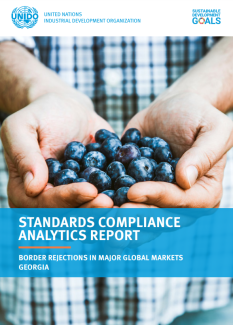Innovative approaches to reducing border rejection for Georgian products
Efforts to enhance the export of Georgian agricultural products to global markets must be based on innovative solutions and data-driven strategies. The newly released Standards Compliance Analytics (SCA) Country Report for Georgia, supported by UNIDO under the Global Quality and Standards Programme (GQSP), highlights the critical need to further develop its quality infrastructure on the national level.
The report, which analyzes border rejection data, identifies diverse causes across key international markets such as the European Union, the United States, China, Japan, and Australia. These causes include additives (17%), hygienic condition/controls (17%), labeling (15%), packaging (14%), adulteration and missing document (14%), mycotoxins (13%) as well as pesticide residues.
By leveraging the SCA tool, the report offers a data-driven approach to identifying several recommendations and their connections with global markets, including the introduction of traceability systems, education on pesticide use, storage and disposal, improving compliance with labeling requirements, further expanding financial incentives for farmers, and promoting quality awareness campaigns, etc.
The main findings of this report will contribute to the ongoing efforts on strengthening pesticide management in the fruits and vegetables value chains by enhancing the technical competence and sustainability of the conformity assessment bodies (laboratories). The report will also encourage the creation of a workable pesticide database and promoting international best practices in pesticide application among Food Business Operators (FBOs) and MSMEs in close cooperation with the Georgian Laboratory Association (GeLab) and other sectoral associations.
Download SCA Report for Georgia here.
For further information contact Giorgi Todua at g.todua [at] unido.org

